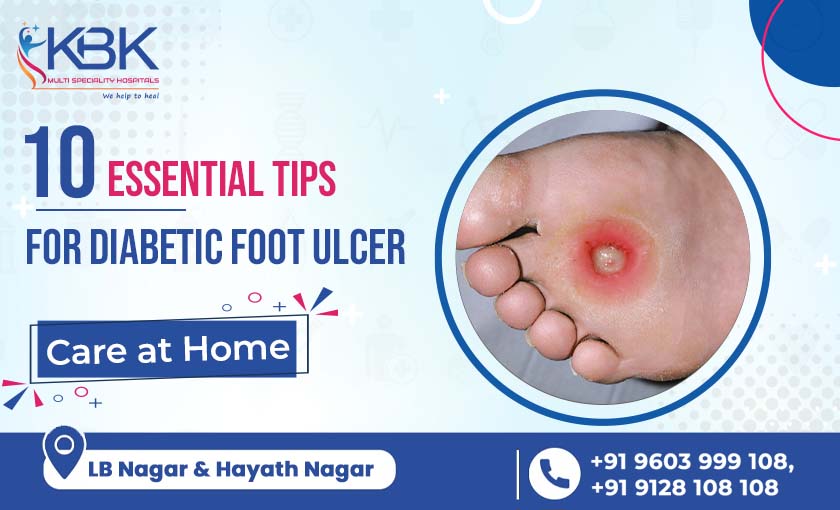Are you searching for a Diabetic foot care clinic in Hyderabad? With diabetes, you may likely develop foot ulcers. But no worries, there are plenty of ways to manage the foot ulcer and heal it. Apart from consulting the best diabetic foot surgeon in Hyderabad, you can also practice some good tips at home to find relief.
It helps you to do your jobs at home safely.
However, seeking medical help from a diabetic foot care clinic in Hyderabad is very important.
10 Essential Tips for Diabetic Foot Ulcer Care at Home
Living with diabetes means paying close attention to your feet, especially if you have developed foot ulcers. These open sores can quickly become serious if not treated properly. Fortunately, several essential tips can help you manage foot ulcers at home and promote healing:
With these easy 10 at-home-to-do tips, you can perfectly take care of your diabetic foot ulcer treatment in Hyderabad.
1. Daily Foot Checks: Inspect your feet thoroughly every day, looking for cuts, redness, swelling, or any changes in skin texture. Use a mirror to check the soles and between your toes.
If you require more information on how to do these checks, you can check with your doctor practicing at diabetic foot clinic in Hyderabad
2. Cleanliness is Key: Wash your feet daily with warm water and mild soap. Dry them thoroughly, especially between your toes. Never soak your feet, as this can soften the skin and increase the risk of infection.
You should also ensure that keeping the ulcer neat and clean, can help the healing process.
For more tips in doing this, seek the help of Diabetic foot care clinic in Hyderabad
3. Moisturize: Use a fragrance-free lotion to keep your feet hydrated and prevent cracking. However, avoid applying moisturizer between your toes, as this can create a moist environment for bacteria.
Which moisturizer is good? Are there going to be any recommendations by your diabetologist?
To get clarifications, seek the consulting services from diabetic foot clinic in Hyderabad.
4. Keep It Protected: Wear comfortable, well-fitting shoes with good arch support and a wide toe box. Avoid shoes that pinch or rub your feet. Consider wearing diabetic socks designed to prevent moisture buildup and pressure points.
5. Manage Blood Sugar: Maintaining good blood sugar control is crucial for healing and preventing further complications. Consult your doctor regularly and follow their recommendations for managing your diabetes.
You know how important this is. Your blood sugar levels can cause a major impact on your diabetes health. Keep an appointment with your best diabetic foot surgeon in Hyderabad and ensure to follow his or her advice.
6. Offload the Pressure: Don’t walk on your foot ulcer. Use crutches or a wheelchair to prevent further damage and promote healing.
If the foot ulcer gets too leaky, it is good consult your diabetic foot clinic in Hyderabad and get the proper treatment. Further it is also important to take care of your foot and avoid, pressure jobs and stay safe from falling or any other causes that deteriorate the health of foot ulcer.
7. Debride Carefully: If your doctor recommends debridement (removal of dead tissue), don’t attempt it yourself. Seek professional help from a best diabetic foot surgeon in Hyderabad.
8. Watch for Infection: Signs of infection include increased redness, swelling, drainage, warmth, or pain around the ulcer. Contact your diabetic foot clinic in Hyderabad for finding the best treatment.
Best diabetic foot surgeon in Hyderabad will be able to help you if you experience any of these symptoms.
9. Manage Stress: Stress can worsen your condition. Practice relaxation techniques like deep breathing or meditation to manage stress and promote healing.
Staying relaxed and taking a lot of rest can help your foot ulcer find its healing a bit early. Otherwise, it may take a long time.
Keeping the help and advice of your best diabetic foot surgeon in Hyderabad can also help in following the guidelines.
10. Stay Informed: Educate yourself about foot ulcers and proper care. Talk to your doctor and seek information from reliable sources like the best diabetic foot care in Hyderabad and the best diabetic surgeon in Hyderabad can help you stay safe and even find cure.
Bonus Tip: Never ignore foot problems. Early detection and treatment are crucial for preventing complications and ensuring successful healing. If you notice any changes in your feet, contact your doctor right away.
Remember: While these tips can help manage foot ulcers at home, they do not replace professional medical care. Always follow your doctor’s specific instructions and seek their advice for any concerns.
To summarise, the following tips can get you heal the diabetic foot ulcer naturally.
- Monitor Blood Sugar Levels: Keeping blood sugar levels within the target range promotes healing and reduces the risk of further complications.
- Inspect Feet Daily: Check your feet for any signs of redness, swelling, or injury. Catching problems early can prevent them from worsening.
- Keep Feet Clean and Dry: Wash your feet daily with mild soap and warm water, then thoroughly dry them, especially between the toes.
- Moisturize Regularly: Use a gentle moisturizer to prevent skin from drying and cracking, but avoid applying it between the toes to prevent fungal infections.
- Choose Proper Footwear: Wear comfortable, well-fitting shoes that provide support and protect your feet from injury. Avoid going barefoot.
- Manage Other Health Conditions: Control conditions like high blood pressure and high cholesterol, as they can affect circulation and delay healing.
- Healthy Diet: Eat a balanced diet rich in fruits, vegetables, lean proteins, and whole grains to support overall health and wound healing.
- Quit Smoking: Smoking restricts blood flow, slowing down the healing process. Quitting smoking can significantly improve healing rates.
- Seek Medical Attention Promptly: If you notice any signs of infection or if the ulcer isn’t healing, consult a healthcare professional promptly.
Remember, proper foot care is essential for managing diabetic foot ulcers and preventing complications.

